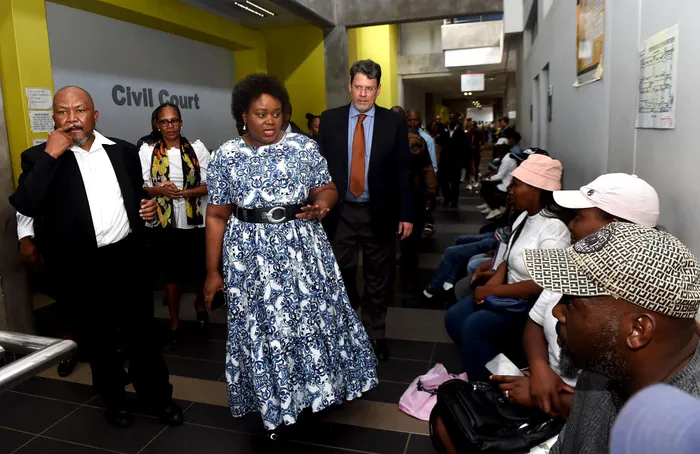
Minister of Justice and Constitutional Development Mmamoloko Kubayi says the National Case Backlog Committee is tasked with addressing blockages experienced in the courts, which lead to delays and postponements that contribute to growing case backlogs.
Image: Itumeleng English / Independent Newspapers
Justice and Constitutional Development Minister Mmamoloko Kubayi has outlined measures aimed at addressing the delays in magistrates’ courts, which result in cases taking months and even years to be resolved.
Kubayi said her department has convened the National Case Backlogs Committee, comprised of members of the judiciary, the National Prosecuting Authority, Legal Aid South Africa, the Office of the Chief Justice, the SAPS, the Department for Correctional Services, the Legal Practice Council, and officials from the department’s court administration branch.
“This committee is tasked with addressing blockages experienced in the courts, which lead to delays and postponements that contribute to growing case backlogs in the courts.
“This committee has at its core an understanding that the cooperation and collaboration of every role player in the criminal and civil justice system is needed to address backlogs,” she said.
Kubayi said it was envisaged that having all the key role players in the committee would allow for speedy resolutions to be reached to challenges experienced in the courts.
She was responding to parliamentary questions from EFF MP Rebecca Mohlala, who wanted to know the steps the department had taken to address the delays in magistrates’ courts that denied justice to both victims and accused persons.
According to Kubayi, the department was concentrating on strengthening internal capacity to support court operations and reduce delays.
Particular attention is being given to improving court-related support services that are essential to the smooth functioning of proceedings, including the provision and coordination of language services in our courts.
The minister also said active steps have been taken to expand the interpreter pool and stabilise the availability of language services in courts.
“To date, approximately 1,824 interpreters, including around 20 South African Sign Language interpreters, have been appointed across the country, with further appointments under consideration.”
Kubayi said the department has advertised over the past six months 85 interpreter positions nationwide, which are expected to be filled by the end of August 2025.
“Additionally, 66 more positions are planned to be advertised in August, with the expectation that these will be filled in September and October 2025. It is anticipated that filling of these positions will contribute significantly to reducing case backlogs that arise from constraints in court administration support, particularly in the coordination and provision of language services.”
The minister added that the Magistrates’ Commission continued to prioritise the filling of magistrates’ positions.
In November 2024, a total of 139 posts were advertised, comprising 71 regional court magistrates, 62 senior magistrates, and six senior magistrates responsible for Judicial Quality Assurance.
In addition to filling of permanent vacancies, the department also appoints acting magistrates as an interim measure to strengthen court capacity and maintain continuity in service delivery.
Kubayi said a total of 878 applications were received for the advertised posts, and interviews by the Appointments Committee for the regional magistrate posts took place in May.
“The short-listing for the posts of senior magistrate is scheduled for the end of July 2025, followed by interviews during August or September 2025,” she said.
She was responding to DA MP Glynnis Breytenbach, who enquired about the vacancy rate in courts, among other things.
Kubayi also said the department has introduced the 100 Days Challenge to address the historic case backlog in sexual offences, domestic violence, and divorce and maintenance matters.
The pilot project started in March 2025 at selected courts and seeks to remove waste from the value processes so as to speed up the turnaround time in the management of cases.
“The department intends to implement the 100 Days Challenge in phases to reduce and ultimately eliminate backlog in gender-based violence and femicide matters from our court rolls. The department is also planning to procure Sexual Offence Systems in the magistrates’ courts to alleviate backlog,” she said.
mayibongwe.maqhina@inl.co.za